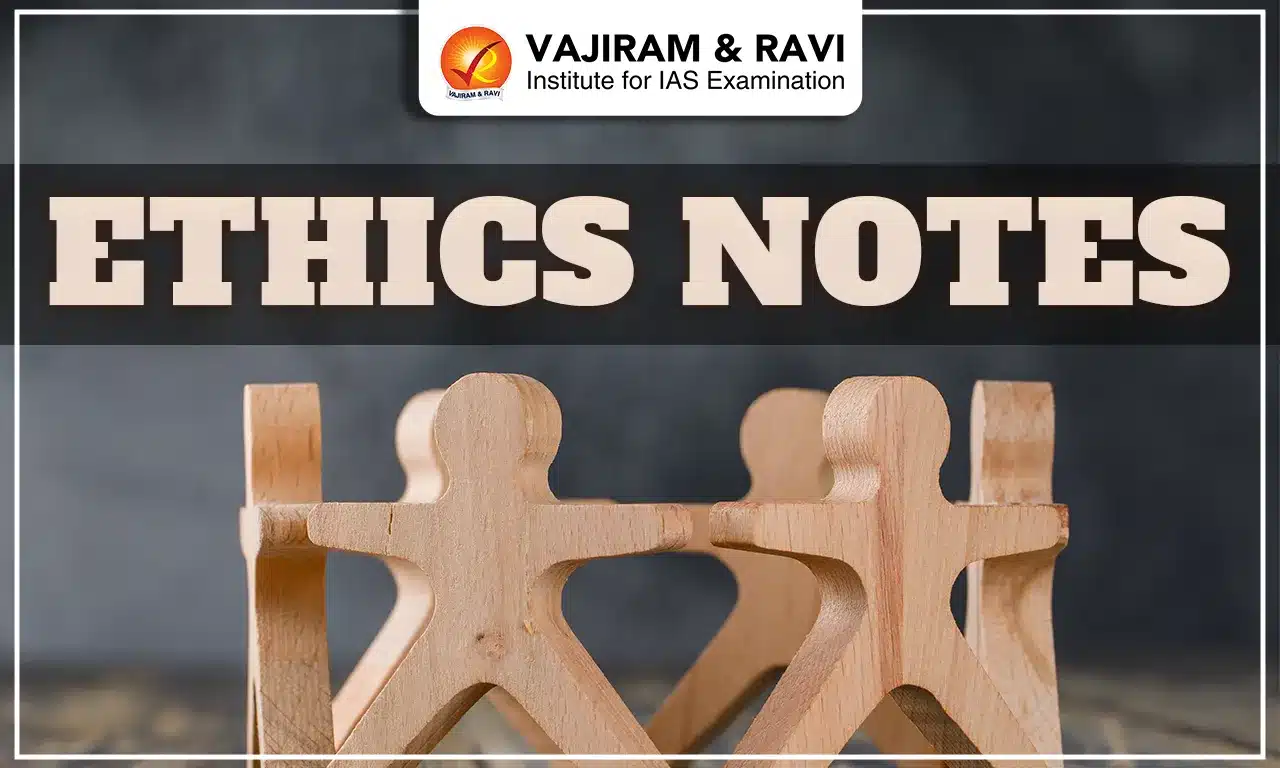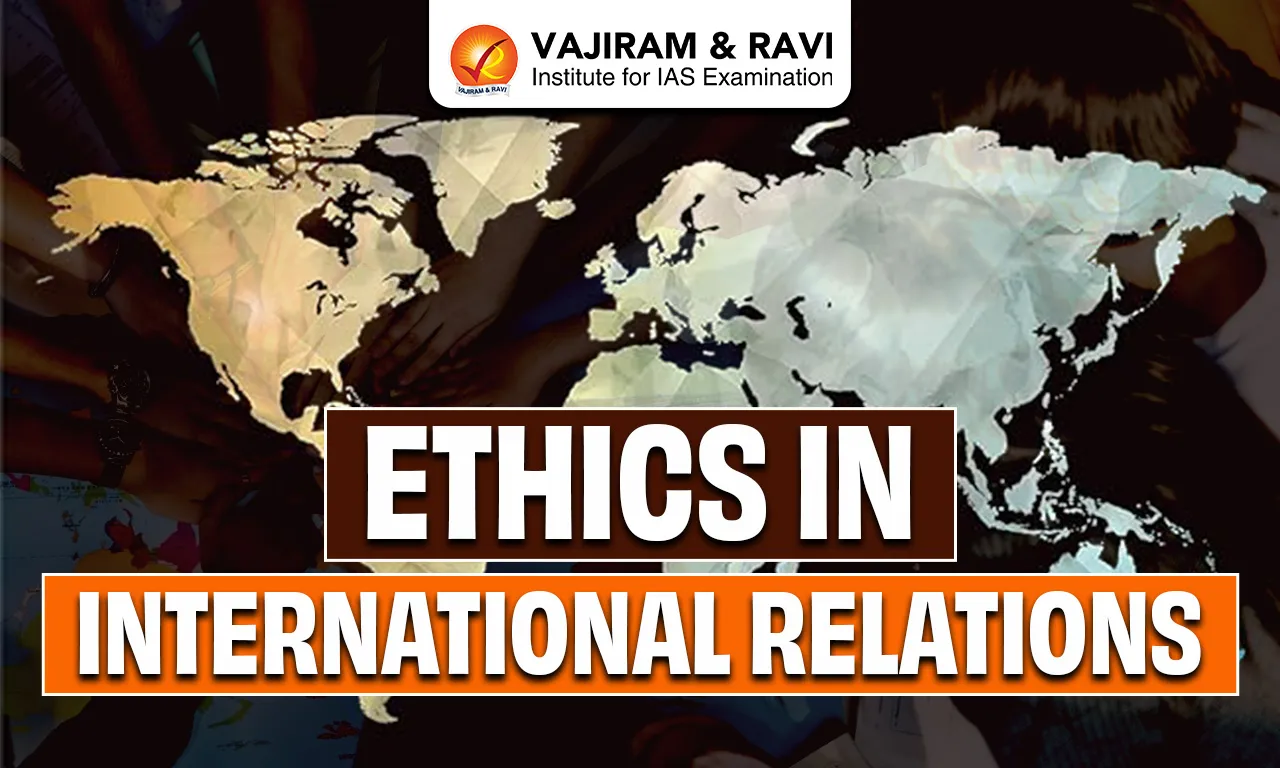Ethics Notes for UPSC play a crucial role in excelling in the Civil Services Mains, focusing on integrity, leadership, and responsible governance. By mastering this subject, aspirants not only enhance their ability to think critically and solve ethical dilemmas. Ethics empowers candidates to stand out in their answers, reflecting the qualities of honesty, fairness, and empathy that the UPSC seeks in civil servants. Keep reading the article to get the download link for Ethics Notes for UPSC PDF.
Ethics Notes for UPSC
Prepared by Vajiram and Ravi's expert faculty, these Ethics Notes for UPSC are updated and cover all important topics in a structured manner. Designed for aspirants, these notes are easy to understand and directly aligned with the syllabus.
UPSC Ethics
The questions related to Ethics plays an important role in UPSC CSE 2026 and to be equipped with updated UPSC Ethics Notes UPSC emphasizes evaluating your ethical understanding and decision-making abilities. Keep reading the article which will help aspirants in the preparation, these notes cover important topics from the UPSC Syllabus 2026.
Ethics and Human Interface
Ethics explores principles guiding right and wrong in human conduct, differing from morals, values, and law. Its essence lies in fostering integrity and accountability. Determinants include culture, religion, and education, with frameworks like the Nolan Committee promoting ethical standards.
- Ethics and Human Interface
- Difference between Ethics and Morals
- Difference between Ethics and Values
- Ethics Vs Law
- Essence of Ethics
- Determinants of Ethics
- Nolan Committee
Dimensions of Ethics
Ethics encompasses diverse dimensions like virtue ethics (character-focused), utilitarianism (maximizing overall good), deontology (duty-based principles), teleology (goal-driven morality), consequentialism (outcome-focused), and egalitarianism (emphasizing equality and fairness in moral decisions).
- Dimensions of Ethics
- Virtue Ethics
- Utilitarianism
- Deontology - Deontological Ethics
- Teleology and Consequentialism
- Egalitarianism
Applied Ethics
Applied ethics examines moral principles in real-world contexts, including business ethics (corporate governance), bioethics (euthanasia), professional ethics, social and cultural ethics, environmental ethics, legal ethics (integrity, recusal), judicial ethics, media ethics, technology ethics, and gender dimensions of ethics.
- Applied Ethics
- Business Ethics - Definition, Importance, Business Ethics and Corporate Governance
- Corporate Governance
- Bioethics
- Euthanesia - Ethical Dimension of mercy killing
- Professional Ethics
- Social Ethics
- Cultural Ethics
- Environmental Ethics
- Legal Ethics (Professional Responsibities, Integrity, Recusal, Live casting(transparency), Nana Palkivala, Emergency)
- Judicial Ethics
- Media Ethics
- Technology Ethics
- Gender dimensions of Ethics
- Business Ethics - Definition, Importance, Business Ethics and Corporate Governance
Human Values (include Universal Values, Basic values)
Human values like universal, moral, socio-cultural, spiritual, constitutional, economic, religious, democratic, and aesthetic values guide behavior. Family, society, and educational institutions play vital roles in nurturing these values and fostering ethical conduct.
- Human Values (include Universal Values, Basic values)
- Moral Values
- Socio-Cultural Values (include Traditional Values)
- Spiritual Values
- Constitutional Values
- Economic Values
- Religious Values
- Democratic Values
- Aesthetic Values
- Role of Family in inculcating values
- Role of Society in inculcating values
- Role of Educational Institutions in inculcating Ethics
Attitude
Attitudes reflect individuals' thoughts, feelings, and behaviors toward people, objects, or issues. Social influence and persuasion shape attitudes, including moral and political ones, driving actions and decisions in personal and societal contexts.
- Attitude
- Social influence and Persuasion
- Persuasion
- Moral and Political attitudes
- Social influence and Persuasion
Aptitude and Foundational Values of Civil Services
Aptitude refers to the ability to perform tasks, differing from attitude, which reflects mindset. Foundational civil service values include integrity, impartiality, objectivity, dedication to public service, empathy, tolerance, compassion, and adherence to bureaucratic ethics.
- Aptitude and Foundational Values of Civil Services
- Aptitude
- Difference between Attitude and Aptitude
- Foundational Values of Civil Services
- Integrity
- Impartiality and Non-partisanship
- Objectiviity
- Dedication to Public Service
- Empathy
- Tolerance
- Compassion
- Bureaucratic Values
- Aptitude
Emotional Intelligence - concepts, and their utilities and application in administration and governance.
EI involves understanding and managing one's emotions and empathizing with others. It complements IQ in decision-making and conflict resolution. In governance, EI enhances leadership, public engagement, and effective administration through empathy and self-regulation.
- Emotional Intelligence - concepts, and their utilities and application in administration and governance.
- Emotion -
- EQ Vs IQ
Contribution of Moral Thinkers and Philosophers from India
Indian thinkers like Mahatma Gandhi (non-violence, truth), Swami Vivekananda (universal brotherhood), Chanakya (ethics in governance), and Buddha (middle path) shaped moral philosophy. Indian philosophies like Vedanta and Jainism emphasize ethics, spirituality, and non-violence.
- Contribution of Moral Thinkers and Philosophers from India
- Indian Thinkers
- Indian Philosophy
Contribution of Moral Thinkers and Philosophers from World
Global moral thinkers like Socrates, Kant, Mill, Confucius, and Aristotle shaped ethical principles influencing governance, morality, and behavior.
- Contribution of Moral Thinkers and Philosophers from World
Public/Civil service values and Ethics in Public administration
Public service values like integrity, accountability, and impartiality guide ethical governance, address dilemmas, ensure good governance, and balance laws with conscience for responsible decision-making in public and private institutions.
- Public/Civil service values and Ethics in Public administration
- Ethical Concerns and Dilemmas in Government
- Ethical Concerns and Dilemmas in Private Institutions
- Laws, rules, regulations and conscience as sources of ethical guidance
- Accountability
- Ethical governance
- Governance
- Good Governance
Probity in Governance
Probity emphasizes transparency, accountability, and ethical public service. It includes RTI Act, Citizen’s Charter, Sevottam Model, and anti-corruption efforts like the Prevention of Corruption Act for efficient service delivery and public fund utilization.
- Probity in Governance
- Concept of Public Service
- Transparency
- Transparency International
- RTI Act 2005 - Right to Information
- Code of Ethics and Code of Conduct
- Citizen's Charter
- Work Culture
- Quality of service Delivery - Public Service Delivery
- Sevottam Model
- Utilization of Public Funds
- Corruption - challenges, factors and wayforward
- Prevention of Corruption Act
Case Study
Ethical issues such as politicization of bureaucracy, crony capitalism, and ethical dilemmas arise in governance, requiring solutions that balance integrity, fairness, and the public interest while addressing systemic challenges.
- Case Study
- Ethical Issues
- Politicization of Bureaucracy
- Crony Capitalism
- Ethical Dilemma
Ethical Concepts
Morality, constitutional morality, virtues, and values like wisdom, sacrifice, truth, discipline, and patriotism guide actions, while theories like John Rawls' justice, rights, duties, and conscience help navigate ethical dilemmas in society and governance.
- Ethical Concepts
- Morality
- Constitutional Morality
- Virtues and Vices
- Wisdom
- Sacrifice
- John Rawl's Theory of Justice
- Rights and Duties
- Duties Vs Responsibilities
- Innovation and Creativity
- Perseverance
- Peace and Harmony
- Love and Hatred
- Education
- Anger and Intolerance
- Power
- Stress
- Conscience
- Spirit of Service
- Truth
- Discipline
- Forgiveness
- Trust
- Patriotism
- Happiness and Joy
- Laws, Rules and Regulations
- Key Term in Ethics - Definition and Examples
- Morality
Last updated on February, 2026
→ UPSC Notification 2026 is now out on the official website at upsconline.nic.in.
→ UPSC IFoS Notification 2026 is now out on the official website at upsconline.nic.in.
→ UPSC Calendar 2026 has been released.
→ Check out the latest UPSC Syllabus 2026 here.
→ Join Vajiram & Ravi’s Interview Guidance Programme for expert help to crack your final UPSC stage.
→ UPSC Mains Result 2025 is now out.
→ UPSC Prelims 2026 will be conducted on 24th May, 2026 & UPSC Mains 2026 will be conducted on 21st August 2026.
→ The UPSC Selection Process is of 3 stages-Prelims, Mains and Interview.
→ Prepare effectively with Vajiram & Ravi’s UPSC Prelims Test Series 2026 featuring full-length mock tests, detailed solutions, and performance analysis.
→ Enroll in Vajiram & Ravi’s UPSC Mains Test Series 2026 for structured answer writing practice, expert evaluation, and exam-oriented feedback.
→ Join Vajiram & Ravi’s Best UPSC Mentorship Program for personalized guidance, strategy planning, and one-to-one support from experienced mentors.
→ UPSC Result 2024 is released with latest UPSC Marksheet 2024. Check Now!
→ UPSC Toppers List 2024 is released now. Shakti Dubey is UPSC AIR 1 2024 Topper.
→ Also check Best UPSC Coaching in India
UPSC Ethics Notes FAQs
Q1. What is ethics according to UPSC?+
Q2. Is ethics difficult in UPSC?+
Q3. Will ethics paper be removed from UPSC?+
Q4. Which is the toughest subject in UPSC?+
Q5. Which book is best for ethics in UPSC?+
















